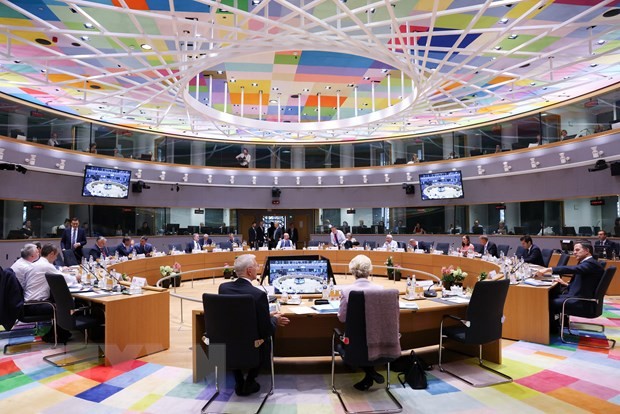(VOVWORLD) - In an unprecedented move, 27 EU state leaders on June 23 granted candidate status to Moldova and Ukraine, taking these two former Soviet Union members to closer to joining the EU. Expansion topped the agenda of last week’s EU summit in Brussels and the concept of “European sovereignty” has been raised.
 European Commission headquarters in Brussels, Belgium. Photo: AFP/VNA European Commission headquarters in Brussels, Belgium. Photo: AFP/VNA
|
Symbolic decision
Ukraine called the EU's decision historic, while Russia swiftly objected to it. It took Ukraine and Moldova only a few months to go from application to approved candidacy, a record short time frame.
Candidate status allows Ukraine to officially open negotiations with the EU. It must pass through 30 negotiating chapters that cover the entire spectrum of EU activities, including taxes, minority rights, free movement of goods and people, and environmental issues. The purpose of these negotiations is to verify whether Ukraine's laws are in line with EU law.
Experts say the European Council’s decision is mainly symbolic because it’s only the beginning of a complicated and lengthy journey, given that the EU will not lower its standards economically, politically, or socially, and especially in terms of freedom, the rule of law, and human rights. The decision, taken in the context of the military conflict in Ukraine, will create challenges for both Kiev and Brussels in the coming months. Ukraine being officially admitted to the EU could take years, with many strings attached.
Whether the EU can afford to accept a candidate like Ukraine is also a question that needs to be answered. These are admission requirements set out for Ukraine, but the EU itself must prepare conditions of budget, decision-making capacity, and more before it can admit more members.
 EU summit in Brussels, June 23, 2022. Photo: Xinhua/VNA EU summit in Brussels, June 23, 2022. Photo: Xinhua/VNA
|
European unification dream challenged
Since 2014, global and regional uncertainties like the Ukraine conflict, the immigration crisis, and public debt crises, Brexit, and the COVID-19 pandemic have threatened the EU’s existence and growth. The EU has sought to strengthen its unity while each member protects its own interests. It has been a turbulent time for the bloc.
In the past few years, the concept of a "Sovereign Europe", aimed at affirming political and economic power both at home and globally, has been articulated. The concept includes the "European Intervention Initiative", a joint military project of 13 European countries outside of existing structures like NATO and the EU’s Defense Arms, and the "Strategic Orientation" adopted during France's EU presidency. The EU launched its Indo-Pacific Strategy in September, 2021. Some members have pushed for a “Budgetary Instrument for Convergence and Competitiveness” that is open to non-Eurozone member countries. During the COVID-19 pandemic, the European Commission approved a European reconstruction fund of 750 billion euros based on the principle of debt sharing. In September, 2020, the EU established the European Coast and Borders Monitoring Agency and published a new draft of the Immigration and Refugee Charter, which is expected to be approved this year.
All these intentions are aimed at realizing the "sovereign European ambition", and the EU's quick granting of a candidate status to Ukraine is part of this goal. But making this dream come true will not be easy. Negotiations to admit a candidate never go smoothly, can take years, and can be reversed. If Ukraine can easily achieve candidate status thanks to the current EU political calculations, officially joining the ranks of the 27-member EU is a completely different story.